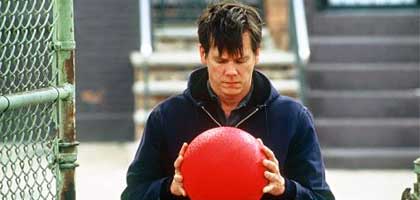
Fly away, Walter
Film of the Month: The Woodsman

The Woodsman, Nicole Kassell's study of a convicted paedophile, lets us empathise without special pleading or sensationalism. By Philip Kemp.
In recent years child abuse has become such a modish subject for films and television you might wonder if anything new can be said about it. But Nicole Kassell's strikingly accomplished debut feature The Woodsman takes the bold step (as did Alan Bennett in the 'Playing Sandwiches' episode of his second Talking Heads series, with David Haig in a tour de force performance as the paedophile park-keeper) of not only focusing on the abuser rather than the victim, but of getting us to empathise with him. And without special pleading, too. Kassell and her co-writer Stevan Fechter - from whose stage play the film is adapted - don't fall back on the standard palliative of giving their protagonist Walter his own history of childhood abuse. In fact it sometimes seems as if Walter is the only person around who hasn't been abused as a child. Instead, he carries scars of a different kind, having been convicted and jailed for 12 years for molesting small girls, and the film traces his painful attempts to readjust to the outside world on his release.
But then, in playing Walter the film's star and executive producer Kevin Bacon can draw on a whole past history of abusing or being abused, even if only in his movies. He was the loathsome care-home security guard Sean Nokes in Barry Levinson's Sleepers, demanding blowjobs from 12-year-old boys and eventually being gunned down in an orgy of revenge. Close cousins to Nokes were John Graham, Bacon's uncredited role as Meg Ryan's stalker in Jane Campion's In the Cut, nervy and unsettling with his cold stare and lopsided grin, and Joe Hickey, the child-kidnapper in Luis Mandoki's Trapped. On the other side of the fence, he was affected by the childhood abuse of his friend in Clint Eastwood's Mystic River and as a male hooker got to deliver the most memorable line in Oliver Stone's JFK: "You don't know shit, Mr Garrison, 'cause you ain't never been fucked in the ass." It's almost as though he has been circling for years around his role in The Woodsman.
As Walter, Bacon gives a performance of agonised inwardness, his bleak, watchful eyes, tense mouth and restless body language conveying a pervading sense of self-disgust as well as a haunted fear of succumbing once again to his own worst impulses. Just occasionally the actor's essential likeability seems to skew the role too far in the character's favour; it's interesting to imagine how differently the film might have played given a creepier actor - Steve Buscemi, say, or Philip Seymour Hoffman - in the part. But then perhaps neither of them could have so effectively brought off the two crucial, sensitively judged scenes where Walter talks to a lonely little girl in a park. Bacon movingly conveys how his liking for the child is pulling him tormentedly in opposed directions - wanting to get close to her in the way prompted by his deepest desires, but at the same time appalled by his awareness that this would only damage her further. Yet at the same time we see him open up in her company, making us realise how his crime, repellent though it is, stems from a genuine pleasure in young girls' society - and how they in turn could be trustingly led to respond to him.
The Woodsman further slants our sympathy in Walter's favour by introducing the figure of the pederast Candy - personifying, as it were, the shadow side to Walter's shadow side. Walter tells his lover Vicki that he "never hurt" the girls he molested, leaving us to infer that he stopped at fondling them, whereas Candy entices little boys into his car and rapes them. And when Lucas, the cop, demands, "You ever see a seven-year-old sodomised in half - broken?", Walter registers shock and repulsion - a reaction which, we can surmise, later impels him to beat up Candy. In effect, it's the Good Paedophile versus the Bad Paedophile, and when we hear of Candy's arrest it's as if Walter has been absolved, cleansed of his worst impulses. After this he can move in with Vicki and start leading a 'normal' life.
These aren't the only places where elements of the script feel a little over-determined. More than once the film leans too heavily on its metaphors of looking and touching. "Birds know I watch them but they like being watched. They know I won't hurt them," says the little girl Robin whom Walter watches and longs to touch. Her words echo those of Vicki, giving Walter an ivy plant: "Notice it once in a while. They love it when you look at them and touch their leaves." There are also a few too many meaningful close-ups of a circular saw biting through wood, emblematic of Walter's jagged frame of mind. And Lucas' invoking of the Little Red Riding Hood tale, which lends the film its title, drags the subtext much too close to the surface (recalling how Little Red is rescued unharmed when the woodsman chops open the wolf's stomach, he muses bitterly, "Ain't no fucking woodsman in this world"). As for plot contrivances, just how likely - at least from a UK perspective - is it that a paedophile out on parole would be allowed to rent an apartment overlooking a schoolyard simply because it was owned by "the only landlord in town who would take my money"?
But these are minor flaws in a film that tackles its edgy subject matter with exceptional control and lack of hysteria. Kassell counterbalances the naturalism of her dialogue and setting - most of the movie was shot on location in and around Philadelphia - with sequences of expressionist editing and narrative devices. A case in point is the handling of Walter and Vicki's first sexual encounter, which rapidly intercuts before, during and after shots - a time-displacement treatment inspired, as Kassell readily admits, by Nicolas Roeg's bedroom scene in Don't Look Now. The technique is effective in conveying Walter's psychological disorientation - this is, after all, presumably his first time with a woman for over 12 years. Later sex scenes between the couple are handled more calmly, with longer takes and warm, subdued lighting, suggesting the two becoming more at ease with each other.
The film's most audacious device is the voiceover from Walter that accompanies Candy's successful enticement of a small boy into his car. It is played like an excitable television commentary on a boxing match, Candy vs 'Cherub' (the little boy), and at first gasp seems like a joke in excruciatingly bad taste, until we realise it's an expression of Walter's desperate attempt to distance himself emotionally from what he's watching and provide an excuse not to get involved.
Kassell draws impressive performances not only from Bacon but from the rest of her cast, especially Hannah Pilkes, astonishingly subtle in her reticence and distress as the little girl Walter befriends, and Kyra Sedgwick (Bacon's real-life wife), feisty and sexy as Vicki. (It helps a lot that both Bacon and Sedgwick are among those rare actors who can carry out routine physical labour as if they know what they're doing; neither of them stretches credibility in the lumberyard scenes.) As Sgt Lucas, rapper Mos Def brings an unexpected hint of mournfulness to what might otherwise be a standard tough-cop role, hinting at the distress of a man forced to see things he'd far rather not. The ending, with its mix of pessimism and optimism - Walter's sister is still rejecting him, but he's moving in with Vicki - typifies the film's refusal to plump for the obvious. The Woodsman is a courageous and sensitive treatment of a subject all too often and too easily sensationalised, all the more impressive as the work of a young first-time feature director.
